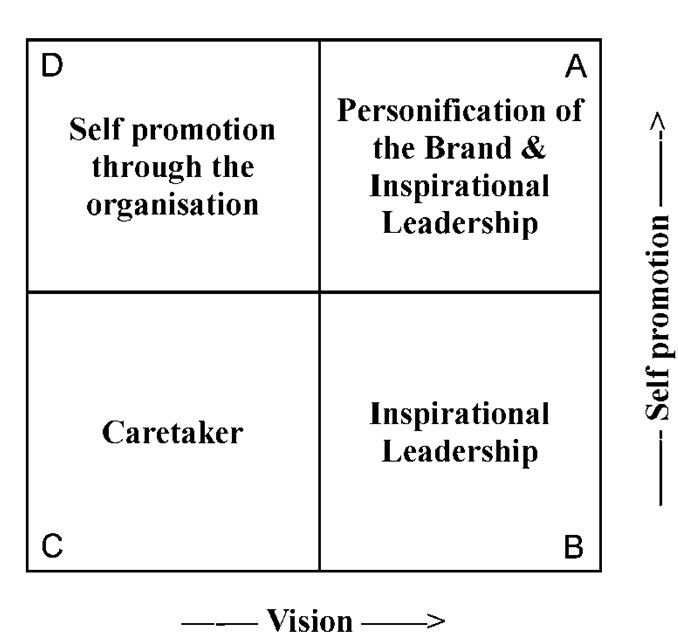Stephen Walker looks at leadership and proposes two factors as being the most significant in leader effectiveness. The ability to create a vision and generate publicity.
Leadership is one of those personal qualities that is easier to detect, than it is to define. Most would agree it is something other than good management.
I’d like to introduce you to a 2x2 matrix which picks out two elements of leadership. You might be able to put names to each cell of matrix. Hopefully, we can get a discussion going about what the characteristics of each cell deliver in terms of leadership to the organisation.
The matrix
The matrix looks at two elements of leadership: vision and self-promotion

Personification of the brand and inspirational leadership
Leaders of businesses dealing with consumers have a need to inspire their staff and an opportunity to personify the brand. Richard Branson is the classic example. He has just appeared on TV dressed in the latest Virgin air hostess uniform. Apparently there was some criticism from staff on the choice of uniform but he found a way to redress that negative feeling and get some free publicity. Yes he made a fool of himself perhaps, but what a great way to say sorry to the staff. His actions, and I’m sure they are very carefully planned, reinforce the brand values and inspire his staff.
Inspirational leadership
Organisations serving business customers tend to show a more sober brand. Their leaders tend to shun the public spotlight but will seek to be on conference panels, appear in the trade press and strive to be the face of the business. They will inspire their staff and often will show them a very different face from their public persona. I’m sure you can name a dozen people at the top of organisations who inspire their staff and shun the limelight. Do you agree the publicity shunning comes from being in a B2B organisation? Are there other factors?
The caretaker
This person isn’t on the television, doesn’t sit on expert panels and doesn’t inspire the staff. This person is just keeping things ticking over. We can all name people like this, you may even have worked for them. They are often called a 'safe pair of hands'. Or am I being too cruel there? What do you think?
The self-promoter
Staff in the unfortunate organisation fronted by a self-promoter can only assume that he or she has embarrassing pictures from the Christmas party or some other hold over his or her boss. This individual uses the resources of the organisation for their own, personal advancement. I’m sure we can all mutter names under our breath that fit this description. They are excellent candidates for headhunting as their present boss is only too willing to give a good reference to back up the public persona.
Inspiring achievement
Good leaders inspire people to achieve something additional:
- They do that by communicating a story, a myth, a vision of what the organisation could deliver. A really good vision will lure people to be part of the grand story, to work toward that end.
- They manage what has to happen to allow people to work toward the vision. So many organisations have processes that prevent people from giving more than the minimum that is contracted.
- They provide the resources that are needed to allow people to contribute to the grand vision, even when outside that person’s contracted role. They see the benefit of inspiring and engaging with the whole person and not just a section of their ability.
Conclusion
Anyone with an expertise can’t help but see more than the rest of us inexpert mortals. They see the world as if through special goggles that reveals patterns, linkages and hidden relationships invisible to others. My expertise is in the behaviour of managers and leaders and their results. It seems obvious to me what the outcomes will be from the leadership behaviour.
Do you agree with my choice of matrix? Do you think there are more important factors in a leader? Let’s spark a dialogue and set a new standard for what is good enough and what is sub-standard.
Stephen is a co-founder of Motivation Matters, set up in 2004 to develop organisation behaviour to drive greater performance. He has worked for notable organisations such as Corning, De La Rue and Buhler and has been hired to help Philips, Lloyds TSB and a raft of others. A published author of articles and Conference speaker, Stephen delivers workshops across the country. It is all about “making people more effective” he says. You can follow Stephen on LinkedIn, Twitter, Facebook, YouTube and Blog










